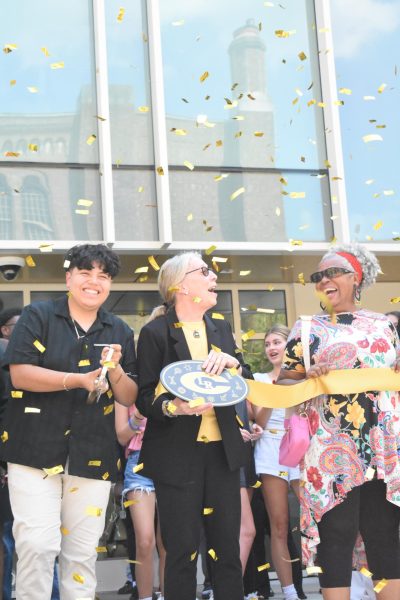Arkansas Legislation Draws Controversy
There has been a flurry of recent legislation in Arkansas which has stirred up controversy. Some, like Rep. Mark Lowery’s education bills proposed in January, faced a whirlwind of criticism and were prevented from leaving the committee. Other legislation has been more successful, like Stand Your Ground, forcing its way past the protest of gun safety advocacy groups like Central’s Students Demand Action. Others remain stagnant, like the hate crimes legislation bill.
Lowery’s proposed bill HB 1218 intended to restrict public school courses and activities related to social justice, and HB 1231 meant to prohibit the teaching of the New York Times’ 1619 Project, a series of publications highlighting the consequences of slavery and the way in which it’s still engrained in our nation. There was a quick public reaction to these proposals.
“Central is a renowned and historic school that has acclaim from one of the biggest social justice movements in history. HB 1218 could prohibit students from engaging and learning about Central’s past and the powerful advocates of the civil rights movement while also prohibiting progress in our school’s future,” senior Joelle Fahoum said.
Across the state, students and teachers voiced dissent for the bills. A petition to stop the bills circulated on social media, along with infographics urging people to call their representatives and demand them to vote no on the bills. Fahoum did research to back up her claims against the bill.
“In almost every class, there’s something to learn from social justice movements in the past. I’ve looked into AP US History and AP Government recent exam questions and have found plenty of multiple-choice, SAQ, FRQ, and DBQ questions that HB 1218 probably wouldn’t be happy about because they could be argued to be isolating certain students,” Fahoum said. “The curriculum is chosen by the College Board and is taught all over the country, so to potentially prohibit and exclude Arkansas students from participating in AP classes that are often so important to our future, like college, is just simply wrong,” Fahoum said.
The widespread criticism paid off for the bill’s opponents. HB 1231 was voted down in the Education Committee, and Rep. Lowery disclosed that he would withdraw 1218 from consideration.
“This legislation is a really good example of the power the public holds to ensure that our legislators are creating laws to help us rather than creating laws that serve no purpose,” teacher Alyce Zottoli said. “We often forget that our representatives work for us. We consent to their ability to make laws through our vote.”
The successful protest of the education bills was followed with frustration. Another widely protested bill, SB 24, was signed into law by the Governor recently. Central’s chapter of Students Demand Action Against Gun Violence voiced opposition to the bill, commonly referred to as Stand Your Ground. Zottoli, the group’s sponsor, explained the potential dangers of the bill.
“It removes the duty to retreat from any self-defense argument. If you are able to leave a situation without using force, you are expected to try, and Stand Your Ground negates that,” Zottoli said. “It allows people to choose violence over peaceful resolutions.”
The law permits an armed person to use deadly force in a conflict if they believe they are in imminent danger. Proponents of the bill say it is needed to protect Arkansans who make quick decisions about protecting themselves, without adequate time to assess whether they can safely retreat. Opponents point out how the same bill has taken a violent toll on black communities in other states.
“Stand Your Ground is a law that is trying to solve a problem that does not exist, there is no evidence that it is necessary,” Zottoli said. “Our legislators are tasked with making Arkansas better by solving problems, and this isn’t one.”
Zottoli also identified the Stand Your Ground laws in other states have caused an increase in homicide rates, and they have been used to keep people who act out of hate or bias from having justice served. She alluded to George Zimmerman, a man who was acquitted after murdering Trayvon Martin, due to Zimmerman invoking the Stand Your Ground law.
This case was not an exception, but rather representative of the increased violence Stand Your Ground provokes nationwide. Research from everytownresearch.org comparing the five years before states started enacting these laws, from 2000-2004, with the 13 years following their enactment, 2005-2017, found that justifiable firearm homicide rates increased by 55 percent in states that enacted Stand Your Ground legislation. In contrast, these rates increased by 20 percent in states without Stand Your Ground. In addition, in states with Stand Your Ground, homicides in which white shooters kill black victims are deemed justifiable five times more often than when the situation is reversed.
“This law would be used by gun owners to perpetuate things that they want to do. People who act out of hate or bias are accommodated. Maybe with a hate crime bill, they could still be held responsible, but we don’t have one,” Zottoli said.
Arkansas is one of three states without hate crimes legislation, but there is a recent attempt to change that. SB 3 would add 20 percent additional jail time, fines, and probation for offenses committed due to a victims attributes, including race, religion, gender, or sexual orientation.
“A hate crime bill is necessary, we know that this kind of hate exists in our state, and we’ve seen what hate can do,” Zottoli said. “People who act out of hate and bias should be held accountable.”
Proposed hate crime bills have failed in the past, but this time around, proponents of the bill remain cautiously hopeful. Governor Asa Hutchinson has expressed support, as have large Arkansas businesses like Walmart and Tyson Foods. Pastors across the state have also come together in support of the bill.
“For me, it’s personal because I’m Jewish. I’ve seen so much antisemitism rise in the past five years and so much hate directed towards people like me. If someone were to act out of hate towards me, I would want them held to that statute,” Zottoli said.
Students Demand Action works to educate about the intersection of gun violence and hate crimes. On the school’s fourth floor there is a Disarm Hate wall created by the club members to share the stories of those who were killed by gun violence. Although Stand Your Ground passed, the students have not given up. In the coming months, they will be working on handwritten letters to legislators to show support for the hate crime bill.
“The legislation that is passed affects you. Your voice is vital in this. Becoming an educated citizen is what upholds our democracy,” Zottoli said. “I’m very proud of our students, of how unafraid you are to call out injustice by name. It makes me very hopeful for a more progressive future.”






